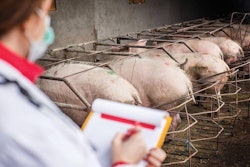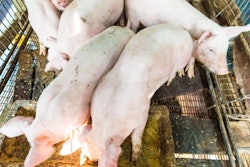
Fecal transplants from wild pigs help prevent spread of African swine fever in domestic animals
Harvesting gut bacteria from wild pigs that show increased resistance to African swine fever (ASF) could help prevent the spread of the virus and other diseases in the future, according to new research from the Research Center in Animal Health at the Institute for Agrifood Research and Technology in Spain.
Although ASF circulates continuously among wild boar in Africa, researchers had observed that these wild pigs are not as susceptible to the virulent outbreaks that afflict domesticated animals, according to Fernando Rodriguez, who heads the ASF research group at ITRA-CReSA. There are genetic differences between the two species, Rodriguez said, but his research team suspected there was more to the story of the wild boars’ resistance to ASF.
The ITRA-CReSA team had established in prior experiments that pigs raised in sterile environments showed greater susceptibility to ASF, even if the pigs were genetically identical. Rodriguez suspected the animal’s microbiota — the microorganisms living on and within the pig — were to blame.
In follow-up research published last month in the journal Scientific Reports, the team demonstrated that fecal transplants from wild warthogs to domesticated pigs provided at least some protection against the ASF virus. Pigs that received the fecal transplant and exposed to a weakened form of ASF did not contract the disease, while the pigs that did not get the transplant fell ill when exposed to the same virus.
“The message we are getting is that warthogs are dealing constantly with viruses, not only ASF,” Rodriguez said. “We assume this will happen with other infections and parasites, and I think part of it is because of the gut microbiota they have.”
The next goal for researchers, Rodriguez said, is to study and isolate specific strains of bacteria from the fecal transplant that could perhaps be introduced as an animal feed additive to confer increased immune resistance to disease, potentially reducing the need for antibiotics.
“Some of the bacteria that we isolated have fantastic immune stimulating capacity,” Rodriguez said. “We are opening a case in which there might be fantastic microbes that might be used in the future on our farms, and hoping that we might not be very far” from that future.
Rodriguez said ITRA-CReSA has also begun a collaboration with researchers in Kenya to evaluate whether the bacteria identified in the ongoing research could be introduced to wild boar populations to reduce the spread of ASF in wild animals.
But Rodriguez doesn’t believe the potential of this research is limited to ASF. Given the properties observed in bacteria identified by their research so far, Rodriguez believes there is potential to develop a next generation of probiotics that fight myriad troublesome diseases — potentially in humans as well as in animals. However, while research into the bacteria is accelerating — Rodriguez said researchers from seven international labs have contacted him about their interest in the bacterial strains — he said it would be at least a year before any products derived from ITRA-CReSA’s work will be available on the market.
“It will be a year, if tomorrow someone puts forward the money to demonstrate this is safe,” Rodriguez said. “If not, it will be five. But the potential is amazing. It’s a gold mine.”
View our continuing coverage of the African swine fever outbreak.

















